人教版高中英语必修四 unit 3 A Taste of English Humour单元课件(共155张PPT)
文档属性
| 名称 | 人教版高中英语必修四 unit 3 A Taste of English Humour单元课件(共155张PPT) |  | |
| 格式 | zip | ||
| 文件大小 | 2.5MB | ||
| 资源类型 | 教案 | ||
| 版本资源 | 人教版(新课程标准) | ||
| 科目 | 英语 | ||
| 更新时间 | 2019-04-19 22:08:39 | ||
图片预览

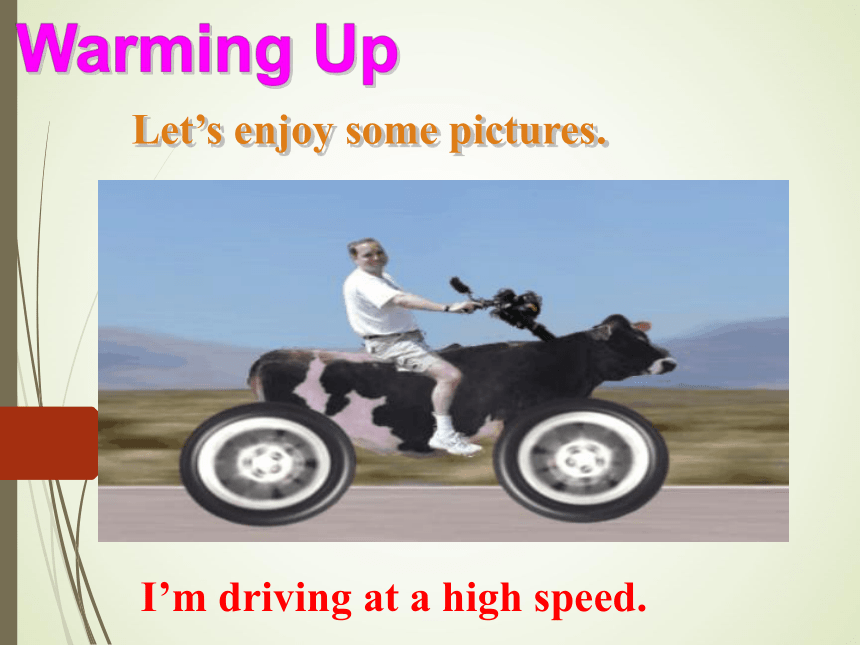

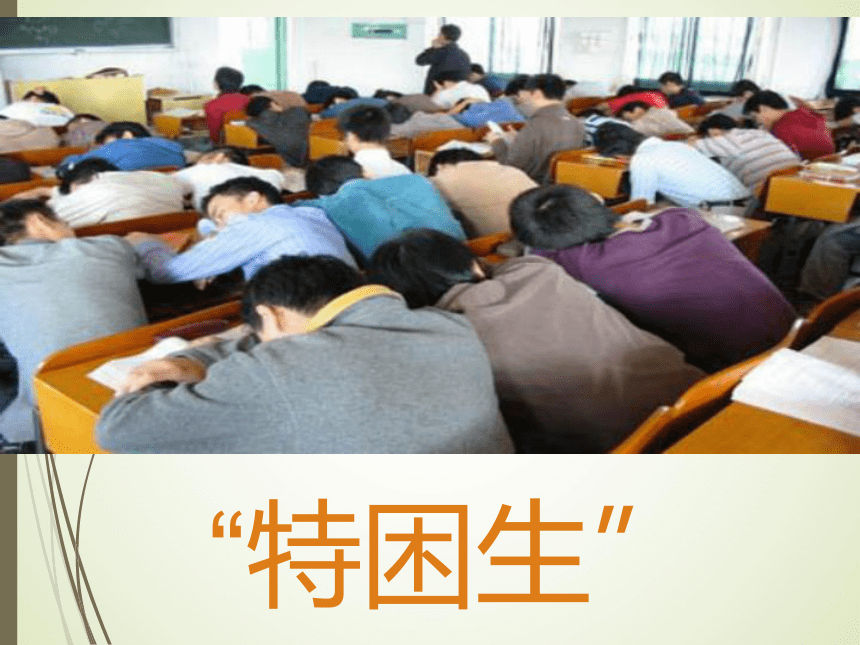
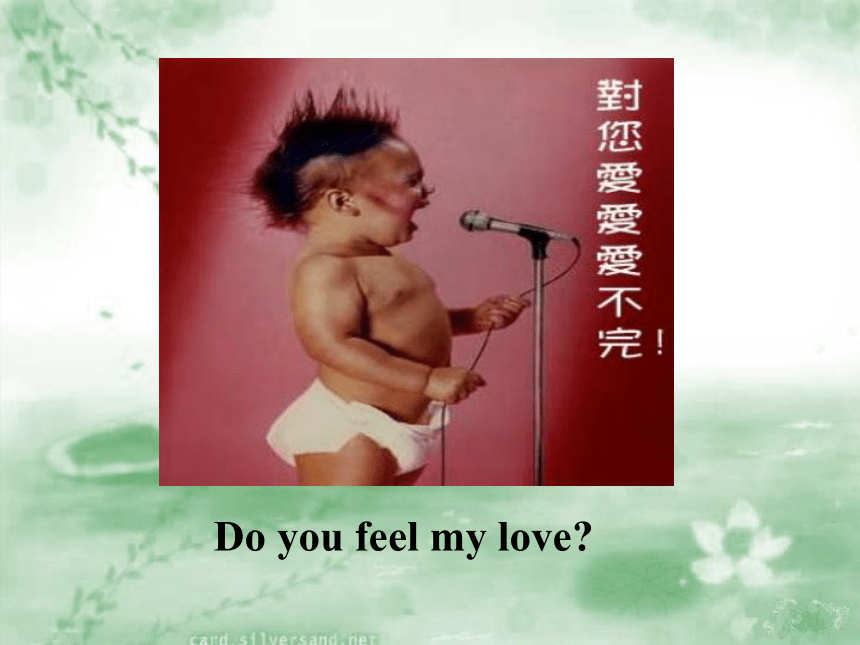
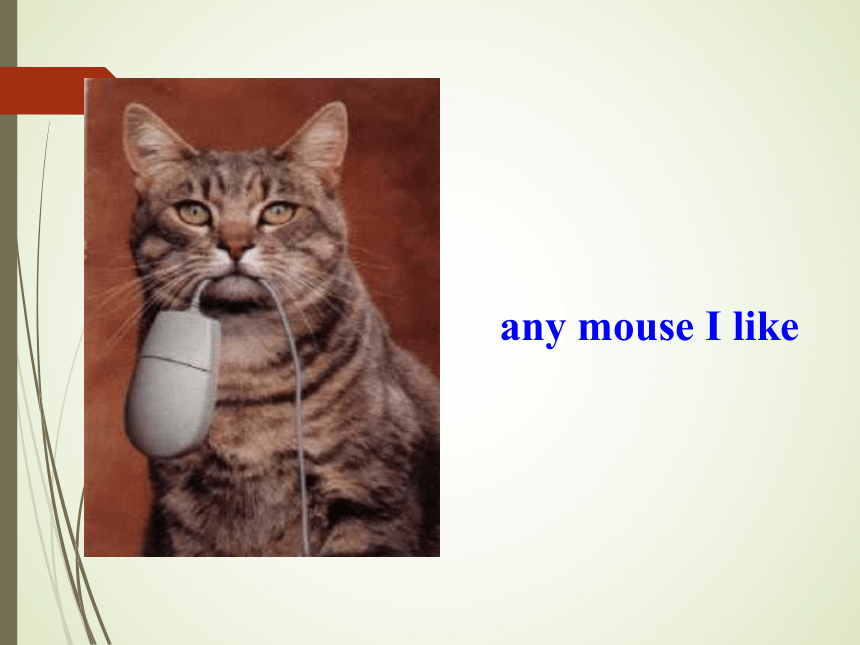

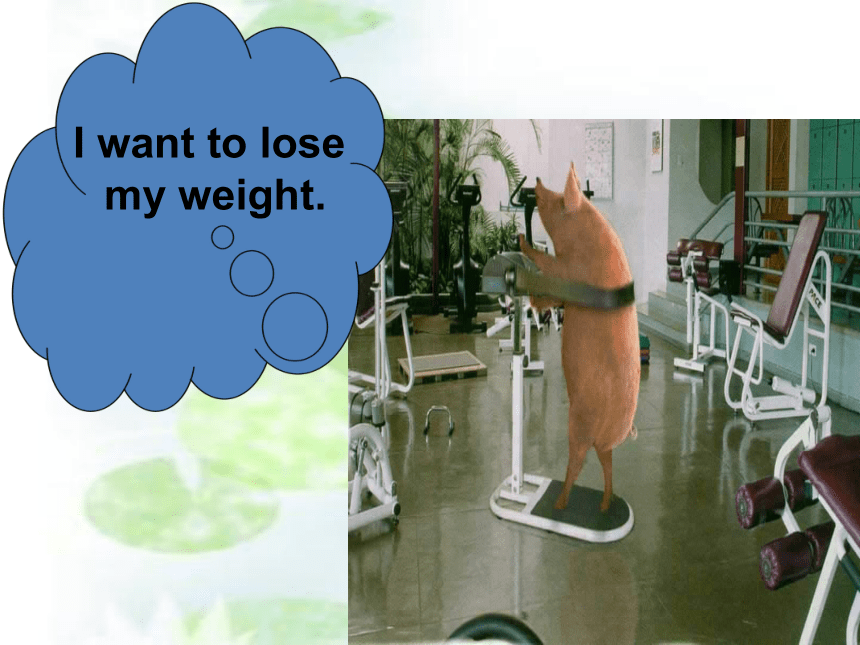
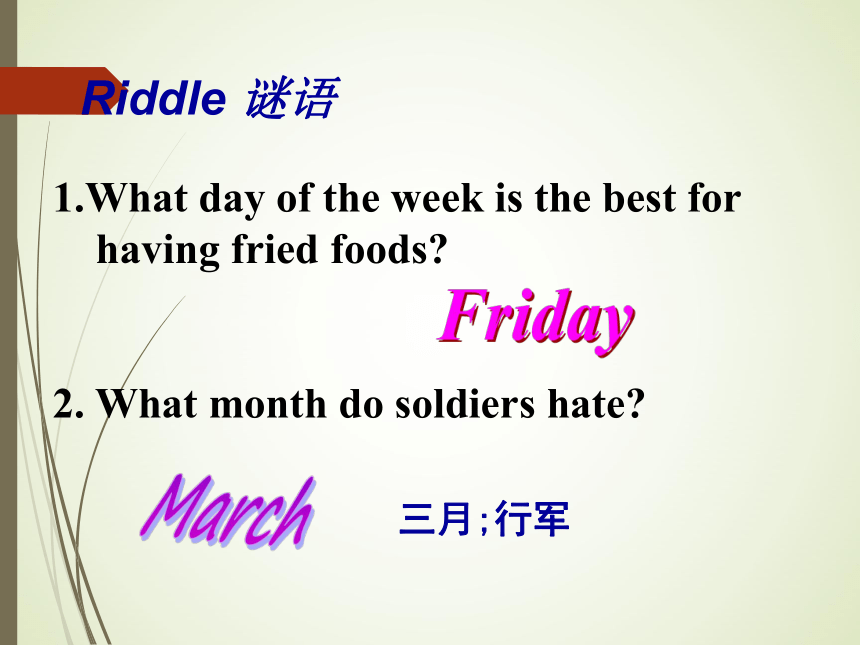
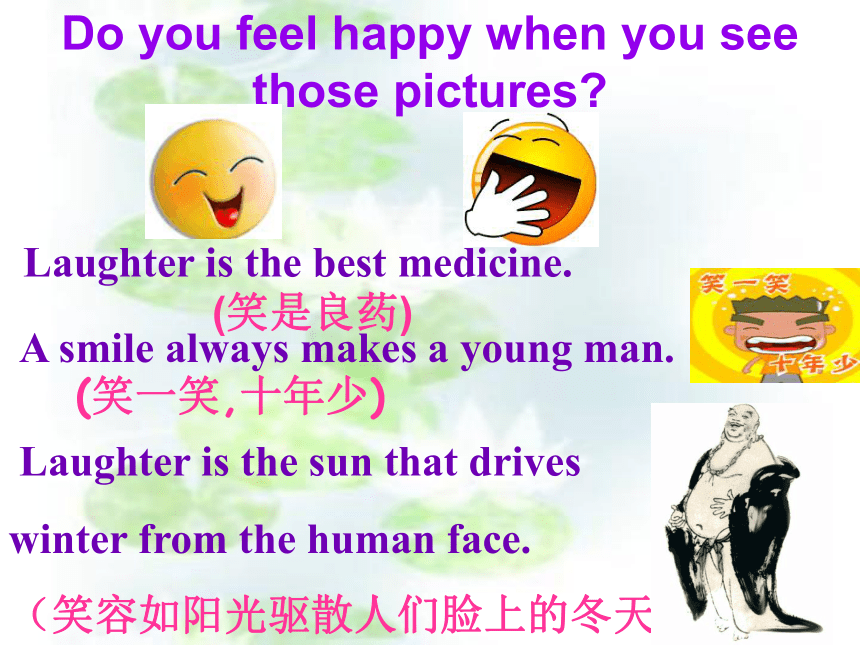
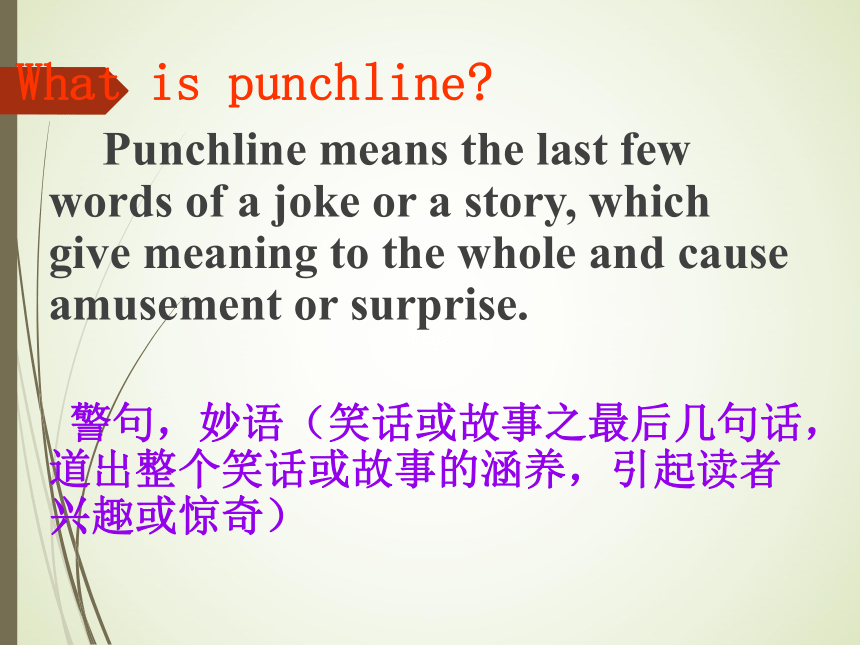
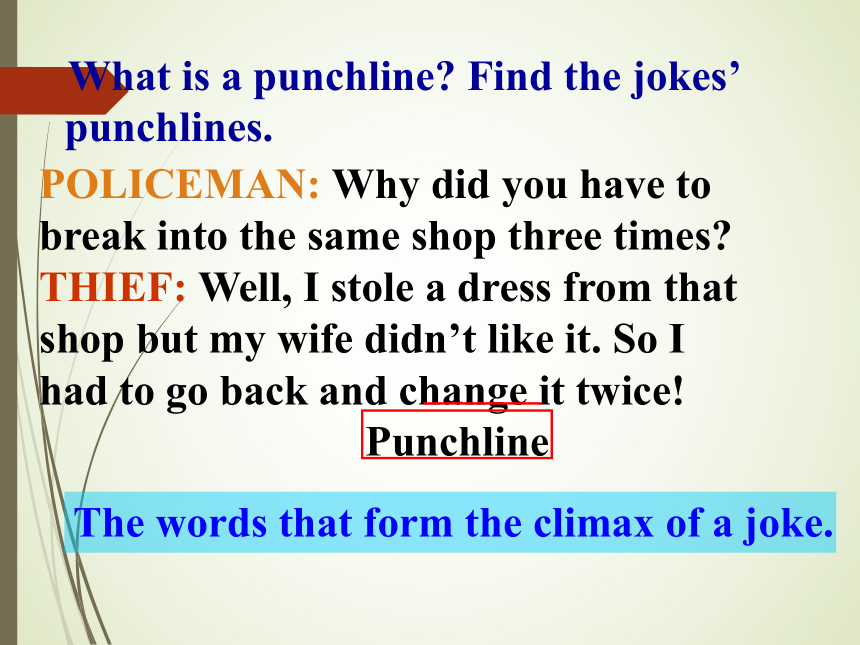
文档简介
课件155张PPT。人教新课标高中必修四
Unit 3 A Taste of English Humour
I’m driving at a high speed.Warming UpLet’s enjoy some pictures. 七点要早读,生活真赶啊...Life is not easyLife is not easy“特困生” Do you feel my love?any mouse I like She is good at Chinese Kongfu.I want to lose
my weight.三月;行军 What day of the week is the best for
having fried foods?FridayMarch2. What month do soldiers hate? Riddle 谜语 Laughter is the best medicine. A smile always makes a young man.
Laughter is the sun that drives
winter from the human face.
(笑是良药)
(笑一笑,十年少)(笑容如阳光驱散人们脸上的冬天)Do you feel happy when you see those pictures?What is punchline?
Punchline means the last few words of a joke or a story, which give meaning to the whole and cause amusement or surprise.
警句,妙语(笑话或故事之最后几句话,道出整个笑话或故事的涵养,引起读者兴趣或惊奇) POLICEMAN: Why did you have to
break into the same shop three times?
THIEF: Well, I stole a dress from that
shop but my wife didn’t like it. So I
had to go back and change it twice! What is a punchline? Find the jokes’
punchlines.PunchlineThe words that form the climax of a joke.TEACHER: You say that john Jones
has a cold and cannot come to school
today. Who am I speaking to?
VOICE: Oh, this is my father.Punchline1. Policeman: You can’t park here.
Driver: Why can’t I ?
Policeman: Read the sign there.
Driver: It says, “Fine for Parking,” so
I parked.Enjoy some verbal jokes:罚款2. Girl : If we marry, will you give me a ring ?
Boy: Of course, What’s your telephone
number?3. Daughter: Auntie kissed me this morning,
Mum! Mum: How nice! Did you kiss her back, dear? Daughter: Of course not. I kissed her face.How many kinds of humor do you know?verbalnonverbalsketch; cross talk
funny poems; funny stories;
jokes; limerick(打油诗) mime ; farce
clown Group workHumor
ways to make people laughfunny poemscross talk 相声Types of humorfunny storiescomedy mime 哑剧sketch小品jokes ???
??哑剧:刘全和 刘全利 打油诗陈佩斯 侯宝林 马三立 幽默笑话(funny stories)Mark Twain was the popular
and humorous American
author. adj. 幽默的mimeMr Bean is funny because he
makes funny faces and acts silly
behaviour. 哑剧,滑稽剧Chinese humoristsWho are they?Do they have something in common ?crosstalkTwo or more speakers
make many jokes and
funny conversation.DiscussionWhich do you like better:
verbal or nonverbal humour
Give your reasons.I prefer verbal humor, because it is
very funny.
I like jokes, because it is worthwhile
to learn about more expressions .You can choose three or more
sentences to express your idea.1. I prefer ________ .
2. Because verbal/nonverbal humor is_____.
3. I like_______ . (mime/sketch/jokes…)
4. It makes me ________.
5. It is worthwhile to do/doing…
6. When I enjoy them, I feel ______ .
7. I like both of them, because they
_____________________ with each other.Reference sentences:(参考句型)humo(u)r n. [u]幽默, 风趣
humourist n. [c] 幽默(作)家,
谈吐幽默的人
humorous adj. 幽默的, 诙谐的 I like a person who ___________________.Mark Twain was a ___________ author and
he was a __________.有幽默感humoroushumoristhas a sense of humornonverbalCharlie ChaplinHe was one of the most famous humorists that can make others laugh all the time. He was a great silent movie star. Charlie ChaplinA Master of Nonverbal Humour What do you want to know about Charlie Chaplin?
He is one of the most humorists that can make others laugh all the time.
What do you know about his
films? What is so interesting
about them?Biography of Charlie ChaplinPre-readingChaplin wrote, ________, and produced many movies he _________.directedstarred inHe was given a ____________ for his lifetime outstanding work.special Oscar●Look at the title and the pictures of the
passage and predict its content. Write
down your idea in one sentence below.
Then skim the passage and see if you were right.The passage is about the life and work of Charlie Chaplin who ___________ the lives of Americans and British through two world wars and ___________________________. brightenedthe hard yearsin betweenReadingA Master of Nonverbal Humourpara.1
para.2
para.3
para.4
para.5Find out the main idea of each paragraph.c) His achievements
e) An example of a sad situation that he made funnya) What his most famous
character was likeb) Why people needed cheeringd) What Charlie’s childhood
was likeRead the passage again and do True or False.1. Charlie Chaplin was poor when he was
a small boy.
2. People who don’t know English cannot
enjoy Chaplin’s films.
3. The Gold Rush is set in California in
the late of the nineteenth century. TFF4. In The Gold Rush Chaplin and his
friend are fortunate to find some gold.
5. In the film the meal he eats is hard to chew.
6. Chaplin not only acted in films but
wrote and directed films as well.FTT a small
black hat a moustache a stick very wide trousersHe wore a small black hat, very wide trousers, a moustache and carried a stick that he swung in the air as he walked.Charlie Chaplin
Early life
★He was _____ in a poor family in 1889 and was taught to sing and dance as a little child.
★His father’s death made the family ________ so he spent his childhood looking after his sick mother and his brother.
★By his _____, he had become one of the most popular child actors in England.bornworse offFill in the blanks.teensMost famous film _________
★______________, a poor, homeless man with a moustache, wore large trousers, worn-out shoes and a small round black hat, and walked around stiffly carrying a walking stick.
★This character was a social _______ but was loved for his optimism and determination to _______ all difficulties.characterThe little trampfailureovercomePerforming skills
★He could mime and act the fool doing _________ everyday tasks.
★His subtle acting made everything ____________.ordinaryentertainingAchievements
★He wrote, ________ and produced the films he starred in.
★In 1972 he got a special Oscar for his ___________ work in films.
★He is loved and remembered as a great actor who could ______ people with great confidence. directedoutstandinginspire 无声的幽默大师?
维克多〃雨果曾经说过“笑容如阳光,驱走人们脸上的冬天。”关于这一点,直到今天也没有人能比查理〃卓别林做得更好。在两次世界大战以及之间的艰苦岁月里,他给英国和美国人民带来了快乐。在人们感到沮丧的时候,卓别林使他们开怀大笑,于是人们对自己的生活感到比较满足。
然而卓别林自己的生活也并不容易。他生于1889年,出身贫寒。他的父母都是杂耍戏院里贫穷的演员。你可能会感到惊奇,查理刚能说话时人们就教他如何唱歌,他刚能走路时人们就教他跳舞。这样的训练在当时的演员家庭中是很普遍的,尤其是在家庭收入经常不稳定的时候。不幸的是他的父亲去世了,整个家庭状况更糟了。所以查理在童年时期就要照顾生病的母亲和弟弟。在十多岁的时候,凭借着自己的幽默,查理已经在英国成为最受欢迎的童星之一。他能够不说话而仅靠动作来模仿傻子做日常的任务。看他的表演没人会感到无聊—他巧妙的表演使得一切都那么滑稽可笑。?随着时间的推移,他开始拍电影。他塑造的可爱的“小流浪汉”角色开始闻名于世,而查理也越来越受欢迎。这个穷苦的无家可归的小流浪汉,留着小胡子,穿着大裤子、破鞋子,头顶着黑色的小圆帽。他手里拿着一根手杖迈着坚硬的步伐四处走动。这个角色是个社会生活中的失败者,但他的乐观精神和战胜困难的决心都使他受到人们的喜爱。面对并不善待他的人,这个弱者依然保持友善的态度。
然而这个小流浪汉是如何把悲凉的遭遇变得滑稽可笑的呢?这里有一个例子,来自于他最著名的电影之一《淘金记》。十九世纪中叶,在阿拉斯加发现了金子。像其他很多人一样,小流浪汉和他的朋友也涌向那里淘金,但却没有成功。相反,他们被暴风雪困在山边的一个小木屋中,没有任何东西可吃。他们饿极了,只好煮了一双皮鞋来充饥。查理首先挑出皮带来吃,像吃意大利面条一样。然后他把皮鞋上端的皮子切下来,就像是切下一块最好的牛排。最后他试着把鞋底割下来嚼着吃。他每一口都嚼得津津有味。卓别林的表演是那么有说服力,以至于你会相信这顿饭是他所吃过的最美味的一餐!
查理〃卓别林自编、自导、自制他主演的电影。1972年他被授予奥斯卡特别奖,以表彰他在电影界的杰出工作。他生活在英国和美国,却在瑞士度过了生命中最后的日子,并于1977年安葬在那里。人们热爱并怀念这位伟大的演员,因为他鼓舞人们并增强人们的信心。Use the information in the passage to complete the notes about Charlie Chaplin.18891977actorLittle tramplarge trousers, worn-out shoes, small round black hat and a walking stick mimeRead the passage again and write
down the main idea of each paragraph.Paragraph 1:
Paragraph 2:
Paragraph 3:
Paragraph 4:
Paragraph 5:Why people needed cheering
upWhat Charlie’s childhood was likeWhat his most famous
character was likeAn example of a sad situation that he made funnyHis achievementsSample summary: In Britain and America people were feeling miserable because of the bad economic situation. Charlie understood their problems. His character “the Little tramp” was poor and homeless, but everybody loved him for his kind heart and the way he dealt with his difficult situation. Charlie Chaplin made people laugh at some of these terrible situations like being without food or money. He wrote and directed his own films and received an Oscar for his outstanding work.DiscussionIn pairs discuss these questions about
Charlie Chaplin.1.Do you think his poor childhood helped him in his work? Why?
Yes, because he understood the problems of people who were very poor.
2.Why do you think he was so successful?
Because he was a wonderful actor, understood and sympathized with people’s problems and tried to cheer them up.What should we learn from Charlie Chaplin?
What should we do to get success?
Discussion?We should be optimistic(乐观) no matter what difficulties you meet with, just as Charlie Chaplin was. Set up an aim
Do our best
Pay more time than others
Never give up/ lose heart
Insist on what we pursue
You have to believe in yourself. That’s the secret of success. ------Charlie Chaplin1. As Victor Hugo once said, “Laughter is the sun that drives winter from the human face”, and up to now nobody has been…Up to now, the work has been quite smooth.
Language points2.He made people laugh at a time _____ they felt _________, so they could feel more content _____ their lives.when depressed with ●He gets cheerful and depressed by turns. 他的情绪高一阵低一阵.
●content adj. 满足的,满意的;n. 内容,目录,容量;满足 vt. 使满足
注:content是表语形容词,若需作定语,可用contented,如a contented person /smile心满意足的人/微笑。
be content to do sth. 乐于做某事
be content with 对……满足/满意
do sth. to one's heart's content 心满意足地、尽情地做某事
content oneself with 满足于;使(某人)自己对……感到满足
He isn’t content with the salary at present,so he's decided to leave the company.
The old man seems content to live here. 这个老人似乎很乐意住在这里。
at a time 意为“每次;一次”。at one time 意为“同时;曾经一度”,常用于过去时。at the time 意为“在那时;在那段时间”。常用于过去时态。例如:
Take two pills at a time. 一次服两粒。
At one time they were friends, but they are seldom together now. 他们曾经是朋友,但是现在很少在一起了。
He agreed at the time but later changed his
mind. 他当时同意了,但后来又改变了主意。 3.Not that Charlie’s own life was easy!Not that 用于句首或短语之前表达否定含义,“倒不是;并不是说”。
Not that I care what they think, but it’s you I’m worrying about.
他们怎么想我不管,我担心的是你。4. His parents were both poor music hall performers. These performers will give us a musical performance in the theatre.
The doctor performed the operation.
What play will be performed tonight? 5. You may find it astonishing that Charlie was taught to sing …
astonish使(某人)吃惊, 震惊。比surprise的语气要强。
e.g. The earthquake astonished me.
地震使我惊慌失措。
be astonished 吃惊
e.g. I was astonished to see her here.
我在这见到她,很惊异。be astonished+ at (by) /to do/that…
被(因)……惊吓
e.g. She was astonished to find he was
drunk.
发现他喝醉了, 她很吃惊。
He was much astonished that you had
failed.
你居然失败,他大感惊讶。
I was astonished at/by the news.
这消息使我大吃一惊。astonishing adj. 令人吃惊的
an astonishing remark 惊人之语
astonishment n. 惊异;惊愕;惊奇
in astonishment 愕然, 吃惊地
e.g. She stared at me in astonishment.
她吃惊地瞪着我。to one’s astonishment 令……惊异的是……
e.g. To our astonishment the little boy
swam across the river. 令我们惊奇的是那小男孩居然游
过了那条河。6. Unfortunately, his father died, leaving the family even worse off, so Charlie Chaplin spent his childhood looking after his sick mother and his brother.
●fortunate adj. 幸运的,交好运的(=lucky)
He is a fortunate man (=a lucky dog).
他是个幸运的人。
I was fortunate to have a good teacher.
我很幸运,有位好老师。派生:fortunately adv.幸好(=luckily常置于句首);unfortunate adj. 不幸的(=unlucky) ;unfortunately adv. 不幸的是(=unluckily);fortune n. 运气,财富,巨款
Unfortunately he won't be here tomorrow evening. 可惜的是他明晚不在这儿。
I am quite badly off recently.
最近我经济上很拮据。
His health is worse off than before.
他的身体比以前更糟糕。
He is quite well off, I hear. 我听说他相当富裕。
He is much better off than I am.
他的日子比我宽裕得多。
注:well-to-do life或a better-off life小康生活;well-off family小康之家 ●badly off 穷的,缺少的,处境差
比较级:worse off境况更差,更穷困
反义词:well off富裕,处境好(比较级:better off) ●leave 作此用法时,常用于“leave+宾语+宾语补足语”结构,可用作宾语补足语的有:形容词、过去分词、现在分词和介词短语。 The financial crisis that originated(源于)on Wall Street swept the world,thus __________large numbers of workers jobless.
A.leaving B.to leave
C.left D.have left
[解析] 考查非谓语动词的用法。动词leave 与其逻辑主语the financial crisis 之间是主谓关系,所以用leaving...作结果状语,相当于which left...。
[答案] A
7. No one was ever bored watching him – his subtle acting made everything entertaining.
Some people use their leisure for such activities because they are lonely or bored.
有些人因为寂寞或无聊,才利用闲暇时间从事这些活动。
There were subtle hints in his letter.
他的信中有些微妙的暗示。
He spends a lot of money entertaining his friends. 他花很多钱款待他的朋友。
an entertaining story/guest一个有趣的故事/客人。
8. ordinary adj.通常的,平常的;普通的,平凡的 She had on an ordinary dress. 她穿着平常的衣服。
The novel describes the way of life of the ordinary people there. 这部小说描写那里的普通人的生活方式。
9. throughout prep. 遍及, 贯穿adv. 到处, 始终, 全部
It rained throughout the night. 雨下了一整夜。
I watched the film and cried throughout.
我看那个电影时从头哭到尾。 10. The tramp, a poor, homeless man with a moustache, wore large trousers, worn-out shoes and a small round black hat. He walked around stiffly carrying a walking stick.
? He is a tramp in shabby old clothes.
他是个衣衫褴褛的流浪者。
?I have much sympathy with those homeless people. 我很同情那些无家可归的人。
When he was twenty years old, he began to have a moustache.
当他二十岁的时候,他长了胡子。
These cars are worn-out and must be replaced.
这些车子破旧了,必须更新。
He got out of bed stiffly. 他手脚不灵便地起了床。
11.The character was a social failure
but was loved for his optimism and determination to overcome all difficulties.
Failure is the mother of success.
At the airport, he expressed optimism about the talks. 在飞机场,他对谈判表示了乐观。
There will be no difficulty in the world that they cannot overcome. ?世界上任何困难他们都可以克服。
12. Charlie first picks out the laces and eat them as if it were spaghetti.
Please pick out the books that you’d like to read. 请把你想看的书选出来。
This picture was taken a long time ago. I wonder if you can ________my father. (湖北)
find out? B. pick out?
C. look out? D. speak out
解析:表示从人群中“辨认出”,用pick out,故选B。
He stopped to do up his shoe lace.
他停下来把鞋带系上。
13.Then he cuts off the leather top of the shoe as if it were the finest steak. Our water supply has been cut off.
我们断水了。
He was in hospital for six months. He felt as if he was ______from the outside world. (安徽)
cut out? B. cut off?
C. cut up? D. cut through
解析:表示与外界“隔绝”,用cut off (from…),故选B。14. Finally he tries cutting and chewing the bottom of the shoe. He eats each mouthful with great enjoyment.
?
Babies like to chew something when they’re teething. 幼儿长牙时爱咬东西。
口香糖 chewing gum
I’m so full I couldn’t eat another mouthful.
我吃得太饱了,一口也不能多吃了。
His father has childlike enjoyment.
他的父亲有孩子似的欢乐。
15.The acting is so convincing that it makes you believe that it is one of the best meals he has ever tasted! convincing adj. 令人信服的
convinced adj. 确信的;信服的
be convinced of 确信;承认
convince oneself of... 查明
convince sb. of... 使某人承认(信服)
convince sb. to do sth. 说服某人去做某事
convince sb. that 从句 使某人承认(信服)……
1.We finally __________ __________ __________our adventure.
我们最终令他们信服了我们的冒险经历。
[答案] convinced them of
2.Her smile __________ __________ __________she was happy.
她的微笑使他确信她是快乐的。
[答案] convinced him that
3.I am __________ __________ his guilt.
我确信他有罪。
[答案] convinced of16. Charlie Chaplin wrote, directed and produced the films he starred in. direct vt. & vi. 导演,指示, 指挥adj. 直接的
adv. 直接地
Chaplin directed the film. 卓别林导演这部电影。
He took a direct flight to New York. 他直飞纽约。
We flew direct from London to New York. 我们直接从伦敦飞到纽约。
star in 主演,在……中担任主角
She has starred in some thirty films. 她主演过大约三十部影片。
She is an outstanding actress. 她是一个杰出的演员。Learning about languageDiscovering useful words and expressionsFill in the chart below:1 In the 1990s, Mr. Bean became a star using mime to highlight difficult social situations much as Charlie Chaplin had done. His method of acting was to appear _________, look around and then do exactly the wrong thing. Children particularly would burst into _______ at his behavior. He always managed to _______ those things that people are uncertainlaughterpick out 2. Answer key for Exercise 2.afraid of doing because they do not want to appear a social _______. On one occasion in a restaurant he ordered a steak tartare. When the uncooked meat arrived he was ________ by shame because he could not eat it. He __________ a piece of meat and pretended to ______ a mouthful but instead put it into the plant pot beside him. He put other pieces into his pocket. failureovercomecut offchew _________ the meal he seemed to show great ___________in his food. He was such an ___________ performer that when he finished eating his dinner, the waiter offered him the same dish again at no extra _______!ThroughoutenjoymentoutstandingchargeSample dialogueS1: How did you help your mother last weekend?
S2: I picked up my clothes and hung them up. I picked out the bad fruit from the bowl so the rest were ready for cooking. I cut the fat off the meat and then cut it up ready for stir-frying. Then I picked the fruit off the trees ready for my mother to sell them in the city and before I went into dinner I cut down the old lotus plants so we can eat the roots. My mother was very pleased with me.particular in particular 特别地
The whole meal was good but the wine in particular was excellent.
be particular about 挑剔, 对….讲究
The girl is very particular about what she wears.
Japanese don't use as much gesture as Europeans.
日本人使用手势没有欧美人那样多。
I only wear a tie on special occasions.
我只在特殊场合才打领带。
Learning about languageDiscovering useful structures
Verb-ing Form as
the object complement, predicative or attribute一、动词-ing形式作表语
动名词作表语表示抽象的、一般的行为,现在分词作表语表示主语的特征、性质和状态。
我们最大的幸福是为人民服务。
Our greatest happiness is serving the people.(动名词)
我们的任务是建设社会主义。
Our task is building socialism. (动名词)我们昨晚看的电影十分动人。
The film we saw last night is quite moving. (现在分词)
他的话很鼓舞人。
His words are encouraging. (现在分词)全析提示:常用来作表语的现在分词有astonishing, amusing, confusing, disappointing, boring, encouraging, inspiring, moving, tiring, interesting, surprising等。二、动词-ing形式作定语
动名词作定语用来说明该名词的用途,不表示名词本身的动作;现在分词作定语与所修饰的名词具有逻辑上的主谓关系,即现在分词相当于所修饰名词的谓语。
我们必须改进工作方法。
We must improve our working method. (动名词)
他们将手术台架设在一座小庙里。
They set up an operating table in a small temple.(动名词)1. 单个动词的-ing形式作定语位于被修饰名词的前面,既可以
1)表示被修饰者的作用或功能,如:
building materials = materials for building 建筑材料
a walking sticka reading rooma writing desk= a stick for walking 手杖
= a room for reading 阅览室
= a desk for writing 写字台
中国是发展中国家。
China is a developing country. (现在分词)
正在做实验的那个学生是我们的班长。
The student making the experiment is our monitor.(现在分词)2)表示所修饰的人或物的动作或状态全析提示:
动名词短语不能作定语,单个的动名词可以用作定语,但仅作前置定语。
如 working method=method for working 工作方法
2. 单个分词和分词短语都可作定语,单个分词一般作前置定语,分词短语则作后置定语,相当于一个定语从句。
如:the man visiting Japan=the man who is visiting Japan 访日的那个人。三、动词-ing形式作宾补
动名词不能作宾语补足语。现在分词作宾补表示的是正在发生的动作。例如:
我看见他正在上楼。
I saw him going upstairs.
我们看着她在过大街。
We watched her crossing the street.
我们听见她在房间里唱歌。
We heard her singing in her room。全析提示:接现在分词作宾语补足语的动词有feel, hear, listen to, see, look at, watch, observe, notice, find, smell, set, have, keep, start, leave, get ,catch等。
1 Look at the examples below, paying attention to the
underlined parts. Here the –ing form is used as
object complement, predicative or attribute. Find
other examples in the passage.
EXAMPLES: his subtle acting made everything entertaining.
( subject; object complement)
What is so interesting about them? (predicative)
a walking stick his charming character ( attribute)宾语补足语; 表语; 定语L6L12L20L30L7L132 Complete the passage with the verbs in their proper forms.
?
?
Once I was lucky enough to watch Charlie Chaplin
___________one of his famous films. I observed him_________ as well as _________in it. He had a particular method of filmmaking. He planned the story and then performed and filmed each scene many times. I saw him making each scene a little different. Then I found him ___________the scenes he liked best and _______them together to make the film more____________. It was an _________experience as it was clear that he did not keep to a strict budget.direct??pick out??make??join??act???entertainmakingdirectingactingpicking outjoiningentertaininginteresting3 The –ing form can be used as the predicative. Can you complete the following sentences using –ing form?
1 Seeing is ___________________________ .
2 His job is ___________________________ .
3 What he likes is ______________________ .
4 The news is _________________________ .
5 The film is more _________ than any that
I’ve ever seen .
6 The novel is not as ___________ as I expected .
7 The comedy was so ____________ that
the audience kept laughing all the time .
believing looking after the animals playing chess after supper encouragingexcitingexcitingamusing4 In pairs have a competition. First complete the sentences in the middle column. Then make as many sentences as you can from this table, using the –ing form as the attribute. Take it in turns and the one who makes the most sentences wins. eating her dinner going to bed earlysitting on the sofa
5 Play a game “ What did you see/hear/notice/observe/watch yesterday?” One of you asks a question and the other answersit using the –ing form as the object complement. Continue this activity until you have collected six sentences. Then tell them
to the class.
EXAMPLE:
S1: What did you see yesterday?
S2: I saw a man sliding on a banana skin. I watched a boy picking up a bottle…Sample for Ex5 on page 21S1: What did you see/hear/notice/observe/watch yesterday?
S2: I saw a man sliding on a banana skin. I watched a boy picking up a bottle from the street and putting it into the dustbin. I noticed a tree leaning over the fence with its branches nearly on the ground. I heard birds singing among its leaves. I observed a mother smiling at her baby as she put her in her pushchair. Answer key for Exercise 1 on page 57:
1. I am looking forward to visit Charlie Chaplin Museum in Switzerland next week. visiting 2. Many people still enjoy seeing Charlie Chaplin’s silent films.
3. That cartoon picture shows Charlie Chaplin watch himself acting in a movie.
4. Charlie’s nonverbal humor often makes people burst with laughters. watching 5. We are all fond of Charlie’s early films, which we think are more interested.
6. I missed to see the beginning of the film City Lights the other day.
7. I wouldn’t mind to see The Gold Rush again with you tonight. interestingseeingseeing 8. Charlie’s job was entertain people, wasn’t he? entertainingThe man holding a mobile phone thinks it necessary to keep in touch with his friends.
The man’s job is dealing with the customers’ complaints (投诉).
I saw this man answering a phone call outside our office building for two hours.Make sentences using ---ing.Make sentences using ---ing.The girl holding the camera is only ten years old.
What Susie enjoys most is taking photographs.
I saw Susie taking photographs of her family.The girl reading her textbook is one of the best students in her class.
What she likes is doing crosswords for fun.
This morning I found her writing for a national newspaper.Reading and speaking
Using languageStep 1. Lead in
:Fire Alarm---“Hurry ,hurry! My house is on fire .”
she shouted to the firefighter on the phone.---“How do we get there?” the firefighter asked .---“Don’t you still have those nice red trucks?”What makes the joke funny? The woman misunderstood the firefighter. The firefighter is asking for information about address. The woman treats it as a question about transportation.Step 2. Scanning Jokes are very popular in English. People can use different kinds of techniques to make people laugh.
This text show us two techniques. 阅读两部分的提示,找到笑话中运用的两种技巧---文字游戏和讲一个短小、滑稽的故事,以及使人发笑的具体方式。What are the two main techniques used in the jokes ?---Play on words
---Tell a short funny story What makes people laugh in the
two techniques ? ---Play on words—Misunderstanding of the word
---Tell a short funny story—an unexpected ending JokesTeacher :What’s wrong with this sentence? “The horse and the cow is in the field.”
Student: I think it should be “The cow and the horse is in the field.” Customer:What‘s wrong with these eggs?
Waiter:Don't ask me. sir, I only lay the table. JokesStep 3. Understanding the jokesRead the three jokes and match the joke with explanation.1---B 2---C 3---ARead the short story of Sherlock Holmes and Doctor Watson .How did Watson answer Holmes’ question? ---He thought of how short life was and how
long the universe lasted.---He thought of how small he was and how vast the sky was .---He thought of how cold the universe was and how warm people can be in their beds. According to Sherlock’s answer ,what happened actually?
---Someone had stolen their tent. Step 4.Discussion Which of these two kinds of jokes you like better. Give the reasons.Suggested answer: I like the first one better.Playing on words is easier to understand. They are common in our daily life . We will misunderstand the whole sentence and make people laugh.Exercise 3N=Narrator SH=Sherlock Holmes
DW=Doctor Watson
N: Sherlock Holmes and Doctor Watson went camping in a mountainous area. They were lying in the open air under the stars. Sherlock Holmes looks up at the stars.
SH (whispering): Watson, when you look at that beautiful sky, what do you think of?
DW: I think of how short life is and how long the universe has lasted.
SH: No, no, Watson. What do you really think of?
DW: I think of how small I am and how vast the sky is.
SH: Try again, Watson.
DW: I think of how cold the universe is and how warm people can be in their beds.
SH: Watson, you fool! You should be thinking that someone has stolen our tent!Language pointson one occasion 曾经, 有一次
on this/that occasion 在这个/那个时刻/场合
on the occasion of 在…之际
on occasion(s) 偶尔,有时
at no extra charge 不用额外付钱
free of charge 免费
keep to a strict budget 遵守严格的预算
balance the budget 平衡预算slide into 悄悄溜进,不知不觉染上
slide out of 溜出
be/feel amused by/ at 觉得…有趣,以…为乐
amuse oneself with/by 以消遣/自娱
to one’s amusement 令人可笑…的是
an amusing story 有趣/好笑的故事
go camping 去露营
in the mountainous area 在山区
whisper sth. to sb 对某人低声说某事
in a whisper/in whispers 低声地
It is whispered that 传闻说
a third time 又/再一次(总共三次)
the third time 第三次
bring out 使明显,显示出
In the open air 在户外,在野外These pancakes made by my mother are really tasty. 我妈妈做的这些煎饼非常好吃。
The detective laid great stress on details.
侦探特别强调细节。
The vast plains stretch for hundreds of miles.辽阔的平原绵延数百英里。
The local economy is now in a mess.
当地的经济现在很混乱。
Porridge is good for digestion.
粥有益于消化。
He was obviously drunk. 他显然是醉了。
Listen to Part 1 and write down the
main idea?
Mary made some jam but left some on
the kitchen table for a few days as she
had to go to look after her sick mother.
Some days later, John, knowing nothing
about the jam, came home and threw it
into the chicken yard.Listening Listen to Part 1 again and answer these
questions.
What was Mary going to do with the cooked plums in the pan?
She was going to put them in the fridge later when they had cooled down.
2. What did John think Mary should have done with the mess in the pan?
He thought she should have thrown it out for the chickens to eat.Mary will laugh1 John will apologize.
2 He will tell her she should not have left the jam on the kitchen table.Possible answers for John and Mary’s reactionsMary will get angry and tell John he should have put the jam in the dustbin1 John will get angry too and say that she should have told him she was making jam.
2 He will laugh and say it is not important.
3 He will apologize.Mary will say that the problems with the chickens are John’s responsibility1 John will deny this saying that she should not have left the jam on the kitchen table.
2 He will say that Mary did not tell him what she had been doing in the kitchen.
3 He did not know the chickens would get sick.Mary got angry with John.
Mary saw the chickens behaving strangely.
John was sorry.
The chickens enjoyed the jam.
John said he thought the jam was porridge.
Mary looked at the red mess on the ground.
John said the chicken were drunk.
Mary came home. Part 2 Put these sentences in order1 3 6 5 2 7 4 8Fill in the blanks. “You _________ my jam,” she shouted. “Oh, ________ what it was,” he said. “I’m _______ but I thought it was _________ which had gone bad in the hot weather. The chickens have _________ the jam, but it’s made them ________.”threw awaythat’ssorryporridgeenjoyeddrunkListening textThe Story Of The Drunken Chickens
Part 1
Mary Smith looked at the beautiful ripe plums. They would make lovely jam. When she had finished the cooking, she filled all her empty jam jars and left the rest of the jam in the pan. She would put it in the fridge when it was cooler. But just then the telephone rang, her mother was in hospital after a car accident. Mary picked up her bag and ran out of the house. Some days later, her husband, John, came home from a business trip. He had been travelling all day and felt like having a drink and a piece of cake. As he came into the kitchen he saw a pan with a dark red mess inside it, he lifted it up and smelled it. It smelled bad. Mary must have forgotten to clean this pan, he thought. So he poured all the jam into the chicken yard and cleaned the pan. Then feeling comfortable, he began to eat a piece of cake.Part 2
??? When Mary returned, she noticed the chickens behaving strangely. They were running round the yard as if they were sick. She saw the dark red mess on the ground and went closer. When she saw a plum stone she went into the kitchen. Her husband was reading a newspaper at the table. Angrily Mary rushed up to him. "You threw away my jam," she shouted, "Oh, that's what it was," he said. "I'm sorry but I thought it was porridge which had gone bad in the hot weather. "Good heavens!" said Mary. "That must be the jam I left in the pan, but why didn't you threw it in the dustbin?" John laughed, "It was a mistake. However, the chickens have enjoyed the jam, except that it has made them drunk. What are we going to do with these drunken chickens?"Speaking and writingSample discussionS1: What fun! I enjoyed that story. I always laugh at that kind of thing.
S2: Me too. I’m pleased we both like the same kind of funny stories.
S1: The punchline was good. You were wondering what would happen. So I’m happy that it all turned out well in the end.
S2: It surprises me that John didn’t see the plum stone if Mary did.S1: That’s because Mary did the cooking, but John didn’t look at the jam carefully. He just thought it was a mess and threw it away.
S2: I think it’s very amusing and always try to read stories like that. They make me smile.Sample writing:Stages in the story
1. Mr. Hills buys a hedge cutter made in China.
2. It breaks down and he tries to mend it himself. 3. The instruction booklet says it should not be touched “without permission”.
4. He decides to get a new one so no one will ever know.
A true story of Mr Hills
Mr Hills in London bought a hedge cutter made in China. It was very small and very cheap and it worked very well.
At first he was very pleased with it. It made his hedges look smart and neat. Then one day it broke down. There was nothing he could do to make it work. He took it apart and put it together again but still it would not work. Next he took out the booklet of instructions to see if they had any advice for him. Imagine his amazement when he saw these words written in the booklet. “No one is to touch or try to repair this hedge cutter without permission.” What was he to do? Should he have written to the manufacturers in Beijing before he had took his hedge cutter mended?
Mr. Hills thought long and hard. Finally he went back to the shop and bought another hedge cutter. He put his old one in the dustbin. He thought no one would ever know what he had done. Write down what you have learned about English humour.
After Learning this unit we have learned what humour is. In our life humour is necessary not only because it can bring laughter and happiness to people, but also because it shows a man’s ability. In this unit we have really tasted English humour from Charlie Chaplin and Mr. Bean. Summing up From this unit you have also learned:
Useful verbs: brighten, content, astonish, entertain, overcome, convince, chew, direct, gesture, slide, amuse, whisper, react…
Useful nouns: humour, performer, tramp, comedy, mime, punchline, teens, moustache, failure, optimism, underdog, snowstorm, leather, lace, mouthful, enjoyment, confidence, costume, gesture, occasion, budget, actress, pancake, explanation, detective, mess, porridge, …Useful adjectives and adverbs: verbal, depressed, astonishing, fortunate, unfortunately, ordinary, bored, subtle, entertaining, charming, throughout, homeless, worn, stiffly, convincing, outstanding, particularly, mountainous, vast, drunk …
Useful expressions: up to now, feel/be content with, badly off, pick out, cut off, star in…
A new grammer item: the –ing form used as the object complement, predicative or attributeReading for fun打油诗老太太房里有张床,
床底下有个小偷把身藏。
紧靠门后边,
贴着地板面,
我担心你的脑袋会着凉。秘鲁老汉作怪梦,
—抱着鞋子亲一通。
夜里睡过来,
吓得只惊呆。
这完全不是梦。Answer key for Exercise 1 on page 56:1. When I got home, the house was in a complete mess.
2. All she could do was to hope that she could sort out the mess.
3. You don’t have to whisper. No one can hear us.
4. people began to whisper that the company might go out of business.C untidinessF problemH speak softlyE talk secretly, especially when spreading romours5. He reacted angrily to the stories people had made up about him.
6. Quite a lot of children react badly to shellfish.
7. This is my stamp collection that I’ve gather for ten years.
8. All my stories have been put together in one collection.B behave in a certain wayD become ill from eating particular foodA set of similar thingsG several poems, stories,ect. in a bookAnswer key for Exercise 2 on page 56: Mary was so angry with John about the jam that she went to stay with her mother in a __________ part of the country. She could not understand why John had thought it was _______ and had thrown it away. “Why couldn’t he behave more sensibly?”she thought to herself. “He found it _________, but I feel he is ________ to blame for the terrible ______ in the chicken yard.”mountainousporridgeamusingdirectlymess However, the ___________ scenery and the _____ mountain ranges soon calmed her. She began to miss John and think fondly of his smiling face and stiff _________. “When I go home,” she thought , “I’ll see if our ________ will allow us to have a holiday in __________. John will love that and we can forget our troubles and have a good time together.” So that is what they did!
outstandingvastmoustachebudgetSwitzland1. 直到现在,医生还对这种致命的疾病束手无策。
Up to now, doctors have been able to do little to treat this deadly disease.
2. 父亲死后的一段时间里,查理非常穷困。
Charlie was quite badly off for a while after his father died.
3. 地震过后,政府为无家可归者提供了食物和毯子。
After the earthquake, the government provided food and blankets for the homeless.Suggested answers to Exercise 3 on Page 564. 爱玛(可)不是一个一般的作家。
Emma is no ordinary writer.
5. 黛西羞涩地走进来,穿着一件破旧的大衣。
Daisy came in shyly wearing a worn-out coat.
6. 比赛过后,戴维挥舞着双臂,十分兴奋。
After the race, David waved his arms in a gesture of excitement.7. 弗雷迪专门为这种场合买了一套西装。
Freddy bought a new suit just for the occasion.
8. 爱德华脚下一滑,在冰上失去了平衡。
Edward slid on the ice and lost his balance.
GoodbyeThank you!
Unit 3 A Taste of English Humour
I’m driving at a high speed.Warming UpLet’s enjoy some pictures. 七点要早读,生活真赶啊...Life is not easyLife is not easy“特困生” Do you feel my love?any mouse I like She is good at Chinese Kongfu.I want to lose
my weight.三月;行军 What day of the week is the best for
having fried foods?FridayMarch2. What month do soldiers hate? Riddle 谜语 Laughter is the best medicine. A smile always makes a young man.
Laughter is the sun that drives
winter from the human face.
(笑是良药)
(笑一笑,十年少)(笑容如阳光驱散人们脸上的冬天)Do you feel happy when you see those pictures?What is punchline?
Punchline means the last few words of a joke or a story, which give meaning to the whole and cause amusement or surprise.
警句,妙语(笑话或故事之最后几句话,道出整个笑话或故事的涵养,引起读者兴趣或惊奇) POLICEMAN: Why did you have to
break into the same shop three times?
THIEF: Well, I stole a dress from that
shop but my wife didn’t like it. So I
had to go back and change it twice! What is a punchline? Find the jokes’
punchlines.PunchlineThe words that form the climax of a joke.TEACHER: You say that john Jones
has a cold and cannot come to school
today. Who am I speaking to?
VOICE: Oh, this is my father.Punchline1. Policeman: You can’t park here.
Driver: Why can’t I ?
Policeman: Read the sign there.
Driver: It says, “Fine for Parking,” so
I parked.Enjoy some verbal jokes:罚款2. Girl : If we marry, will you give me a ring ?
Boy: Of course, What’s your telephone
number?3. Daughter: Auntie kissed me this morning,
Mum! Mum: How nice! Did you kiss her back, dear? Daughter: Of course not. I kissed her face.How many kinds of humor do you know?verbalnonverbalsketch; cross talk
funny poems; funny stories;
jokes; limerick(打油诗) mime ; farce
clown Group workHumor
ways to make people laughfunny poemscross talk 相声Types of humorfunny storiescomedy mime 哑剧sketch小品jokes ???
??哑剧:刘全和 刘全利 打油诗陈佩斯 侯宝林 马三立 幽默笑话(funny stories)Mark Twain was the popular
and humorous American
author. adj. 幽默的mimeMr Bean is funny because he
makes funny faces and acts silly
behaviour. 哑剧,滑稽剧Chinese humoristsWho are they?Do they have something in common ?crosstalkTwo or more speakers
make many jokes and
funny conversation.DiscussionWhich do you like better:
verbal or nonverbal humour
Give your reasons.I prefer verbal humor, because it is
very funny.
I like jokes, because it is worthwhile
to learn about more expressions .You can choose three or more
sentences to express your idea.1. I prefer ________ .
2. Because verbal/nonverbal humor is_____.
3. I like_______ . (mime/sketch/jokes…)
4. It makes me ________.
5. It is worthwhile to do/doing…
6. When I enjoy them, I feel ______ .
7. I like both of them, because they
_____________________ with each other.Reference sentences:(参考句型)humo(u)r n. [u]幽默, 风趣
humourist n. [c] 幽默(作)家,
谈吐幽默的人
humorous adj. 幽默的, 诙谐的 I like a person who ___________________.Mark Twain was a ___________ author and
he was a __________.有幽默感humoroushumoristhas a sense of humornonverbalCharlie ChaplinHe was one of the most famous humorists that can make others laugh all the time. He was a great silent movie star. Charlie ChaplinA Master of Nonverbal Humour What do you want to know about Charlie Chaplin?
He is one of the most humorists that can make others laugh all the time.
What do you know about his
films? What is so interesting
about them?Biography of Charlie ChaplinPre-readingChaplin wrote, ________, and produced many movies he _________.directedstarred inHe was given a ____________ for his lifetime outstanding work.special Oscar●Look at the title and the pictures of the
passage and predict its content. Write
down your idea in one sentence below.
Then skim the passage and see if you were right.The passage is about the life and work of Charlie Chaplin who ___________ the lives of Americans and British through two world wars and ___________________________. brightenedthe hard yearsin betweenReadingA Master of Nonverbal Humourpara.1
para.2
para.3
para.4
para.5Find out the main idea of each paragraph.c) His achievements
e) An example of a sad situation that he made funnya) What his most famous
character was likeb) Why people needed cheeringd) What Charlie’s childhood
was likeRead the passage again and do True or False.1. Charlie Chaplin was poor when he was
a small boy.
2. People who don’t know English cannot
enjoy Chaplin’s films.
3. The Gold Rush is set in California in
the late of the nineteenth century. TFF4. In The Gold Rush Chaplin and his
friend are fortunate to find some gold.
5. In the film the meal he eats is hard to chew.
6. Chaplin not only acted in films but
wrote and directed films as well.FTT a small
black hat a moustache a stick very wide trousersHe wore a small black hat, very wide trousers, a moustache and carried a stick that he swung in the air as he walked.Charlie Chaplin
Early life
★He was _____ in a poor family in 1889 and was taught to sing and dance as a little child.
★His father’s death made the family ________ so he spent his childhood looking after his sick mother and his brother.
★By his _____, he had become one of the most popular child actors in England.bornworse offFill in the blanks.teensMost famous film _________
★______________, a poor, homeless man with a moustache, wore large trousers, worn-out shoes and a small round black hat, and walked around stiffly carrying a walking stick.
★This character was a social _______ but was loved for his optimism and determination to _______ all difficulties.characterThe little trampfailureovercomePerforming skills
★He could mime and act the fool doing _________ everyday tasks.
★His subtle acting made everything ____________.ordinaryentertainingAchievements
★He wrote, ________ and produced the films he starred in.
★In 1972 he got a special Oscar for his ___________ work in films.
★He is loved and remembered as a great actor who could ______ people with great confidence. directedoutstandinginspire 无声的幽默大师?
维克多〃雨果曾经说过“笑容如阳光,驱走人们脸上的冬天。”关于这一点,直到今天也没有人能比查理〃卓别林做得更好。在两次世界大战以及之间的艰苦岁月里,他给英国和美国人民带来了快乐。在人们感到沮丧的时候,卓别林使他们开怀大笑,于是人们对自己的生活感到比较满足。
然而卓别林自己的生活也并不容易。他生于1889年,出身贫寒。他的父母都是杂耍戏院里贫穷的演员。你可能会感到惊奇,查理刚能说话时人们就教他如何唱歌,他刚能走路时人们就教他跳舞。这样的训练在当时的演员家庭中是很普遍的,尤其是在家庭收入经常不稳定的时候。不幸的是他的父亲去世了,整个家庭状况更糟了。所以查理在童年时期就要照顾生病的母亲和弟弟。在十多岁的时候,凭借着自己的幽默,查理已经在英国成为最受欢迎的童星之一。他能够不说话而仅靠动作来模仿傻子做日常的任务。看他的表演没人会感到无聊—他巧妙的表演使得一切都那么滑稽可笑。?随着时间的推移,他开始拍电影。他塑造的可爱的“小流浪汉”角色开始闻名于世,而查理也越来越受欢迎。这个穷苦的无家可归的小流浪汉,留着小胡子,穿着大裤子、破鞋子,头顶着黑色的小圆帽。他手里拿着一根手杖迈着坚硬的步伐四处走动。这个角色是个社会生活中的失败者,但他的乐观精神和战胜困难的决心都使他受到人们的喜爱。面对并不善待他的人,这个弱者依然保持友善的态度。
然而这个小流浪汉是如何把悲凉的遭遇变得滑稽可笑的呢?这里有一个例子,来自于他最著名的电影之一《淘金记》。十九世纪中叶,在阿拉斯加发现了金子。像其他很多人一样,小流浪汉和他的朋友也涌向那里淘金,但却没有成功。相反,他们被暴风雪困在山边的一个小木屋中,没有任何东西可吃。他们饿极了,只好煮了一双皮鞋来充饥。查理首先挑出皮带来吃,像吃意大利面条一样。然后他把皮鞋上端的皮子切下来,就像是切下一块最好的牛排。最后他试着把鞋底割下来嚼着吃。他每一口都嚼得津津有味。卓别林的表演是那么有说服力,以至于你会相信这顿饭是他所吃过的最美味的一餐!
查理〃卓别林自编、自导、自制他主演的电影。1972年他被授予奥斯卡特别奖,以表彰他在电影界的杰出工作。他生活在英国和美国,却在瑞士度过了生命中最后的日子,并于1977年安葬在那里。人们热爱并怀念这位伟大的演员,因为他鼓舞人们并增强人们的信心。Use the information in the passage to complete the notes about Charlie Chaplin.18891977actorLittle tramplarge trousers, worn-out shoes, small round black hat and a walking stick mimeRead the passage again and write
down the main idea of each paragraph.Paragraph 1:
Paragraph 2:
Paragraph 3:
Paragraph 4:
Paragraph 5:Why people needed cheering
upWhat Charlie’s childhood was likeWhat his most famous
character was likeAn example of a sad situation that he made funnyHis achievementsSample summary: In Britain and America people were feeling miserable because of the bad economic situation. Charlie understood their problems. His character “the Little tramp” was poor and homeless, but everybody loved him for his kind heart and the way he dealt with his difficult situation. Charlie Chaplin made people laugh at some of these terrible situations like being without food or money. He wrote and directed his own films and received an Oscar for his outstanding work.DiscussionIn pairs discuss these questions about
Charlie Chaplin.1.Do you think his poor childhood helped him in his work? Why?
Yes, because he understood the problems of people who were very poor.
2.Why do you think he was so successful?
Because he was a wonderful actor, understood and sympathized with people’s problems and tried to cheer them up.What should we learn from Charlie Chaplin?
What should we do to get success?
Discussion?We should be optimistic(乐观) no matter what difficulties you meet with, just as Charlie Chaplin was. Set up an aim
Do our best
Pay more time than others
Never give up/ lose heart
Insist on what we pursue
You have to believe in yourself. That’s the secret of success. ------Charlie Chaplin1. As Victor Hugo once said, “Laughter is the sun that drives winter from the human face”, and up to now nobody has been…Up to now, the work has been quite smooth.
Language points2.He made people laugh at a time _____ they felt _________, so they could feel more content _____ their lives.when depressed with ●He gets cheerful and depressed by turns. 他的情绪高一阵低一阵.
●content adj. 满足的,满意的;n. 内容,目录,容量;满足 vt. 使满足
注:content是表语形容词,若需作定语,可用contented,如a contented person /smile心满意足的人/微笑。
be content to do sth. 乐于做某事
be content with 对……满足/满意
do sth. to one's heart's content 心满意足地、尽情地做某事
content oneself with 满足于;使(某人)自己对……感到满足
He isn’t content with the salary at present,so he's decided to leave the company.
The old man seems content to live here. 这个老人似乎很乐意住在这里。
at a time 意为“每次;一次”。at one time 意为“同时;曾经一度”,常用于过去时。at the time 意为“在那时;在那段时间”。常用于过去时态。例如:
Take two pills at a time. 一次服两粒。
At one time they were friends, but they are seldom together now. 他们曾经是朋友,但是现在很少在一起了。
He agreed at the time but later changed his
mind. 他当时同意了,但后来又改变了主意。 3.Not that Charlie’s own life was easy!Not that 用于句首或短语之前表达否定含义,“倒不是;并不是说”。
Not that I care what they think, but it’s you I’m worrying about.
他们怎么想我不管,我担心的是你。4. His parents were both poor music hall performers. These performers will give us a musical performance in the theatre.
The doctor performed the operation.
What play will be performed tonight? 5. You may find it astonishing that Charlie was taught to sing …
astonish使(某人)吃惊, 震惊。比surprise的语气要强。
e.g. The earthquake astonished me.
地震使我惊慌失措。
be astonished 吃惊
e.g. I was astonished to see her here.
我在这见到她,很惊异。be astonished+ at (by) /to do/that…
被(因)……惊吓
e.g. She was astonished to find he was
drunk.
发现他喝醉了, 她很吃惊。
He was much astonished that you had
failed.
你居然失败,他大感惊讶。
I was astonished at/by the news.
这消息使我大吃一惊。astonishing adj. 令人吃惊的
an astonishing remark 惊人之语
astonishment n. 惊异;惊愕;惊奇
in astonishment 愕然, 吃惊地
e.g. She stared at me in astonishment.
她吃惊地瞪着我。to one’s astonishment 令……惊异的是……
e.g. To our astonishment the little boy
swam across the river. 令我们惊奇的是那小男孩居然游
过了那条河。6. Unfortunately, his father died, leaving the family even worse off, so Charlie Chaplin spent his childhood looking after his sick mother and his brother.
●fortunate adj. 幸运的,交好运的(=lucky)
He is a fortunate man (=a lucky dog).
他是个幸运的人。
I was fortunate to have a good teacher.
我很幸运,有位好老师。派生:fortunately adv.幸好(=luckily常置于句首);unfortunate adj. 不幸的(=unlucky) ;unfortunately adv. 不幸的是(=unluckily);fortune n. 运气,财富,巨款
Unfortunately he won't be here tomorrow evening. 可惜的是他明晚不在这儿。
I am quite badly off recently.
最近我经济上很拮据。
His health is worse off than before.
他的身体比以前更糟糕。
He is quite well off, I hear. 我听说他相当富裕。
He is much better off than I am.
他的日子比我宽裕得多。
注:well-to-do life或a better-off life小康生活;well-off family小康之家 ●badly off 穷的,缺少的,处境差
比较级:worse off境况更差,更穷困
反义词:well off富裕,处境好(比较级:better off) ●leave 作此用法时,常用于“leave+宾语+宾语补足语”结构,可用作宾语补足语的有:形容词、过去分词、现在分词和介词短语。 The financial crisis that originated(源于)on Wall Street swept the world,thus __________large numbers of workers jobless.
A.leaving B.to leave
C.left D.have left
[解析] 考查非谓语动词的用法。动词leave 与其逻辑主语the financial crisis 之间是主谓关系,所以用leaving...作结果状语,相当于which left...。
[答案] A
7. No one was ever bored watching him – his subtle acting made everything entertaining.
Some people use their leisure for such activities because they are lonely or bored.
有些人因为寂寞或无聊,才利用闲暇时间从事这些活动。
There were subtle hints in his letter.
他的信中有些微妙的暗示。
He spends a lot of money entertaining his friends. 他花很多钱款待他的朋友。
an entertaining story/guest一个有趣的故事/客人。
8. ordinary adj.通常的,平常的;普通的,平凡的 She had on an ordinary dress. 她穿着平常的衣服。
The novel describes the way of life of the ordinary people there. 这部小说描写那里的普通人的生活方式。
9. throughout prep. 遍及, 贯穿adv. 到处, 始终, 全部
It rained throughout the night. 雨下了一整夜。
I watched the film and cried throughout.
我看那个电影时从头哭到尾。 10. The tramp, a poor, homeless man with a moustache, wore large trousers, worn-out shoes and a small round black hat. He walked around stiffly carrying a walking stick.
? He is a tramp in shabby old clothes.
他是个衣衫褴褛的流浪者。
?I have much sympathy with those homeless people. 我很同情那些无家可归的人。
When he was twenty years old, he began to have a moustache.
当他二十岁的时候,他长了胡子。
These cars are worn-out and must be replaced.
这些车子破旧了,必须更新。
He got out of bed stiffly. 他手脚不灵便地起了床。
11.The character was a social failure
but was loved for his optimism and determination to overcome all difficulties.
Failure is the mother of success.
At the airport, he expressed optimism about the talks. 在飞机场,他对谈判表示了乐观。
There will be no difficulty in the world that they cannot overcome. ?世界上任何困难他们都可以克服。
12. Charlie first picks out the laces and eat them as if it were spaghetti.
Please pick out the books that you’d like to read. 请把你想看的书选出来。
This picture was taken a long time ago. I wonder if you can ________my father. (湖北)
find out? B. pick out?
C. look out? D. speak out
解析:表示从人群中“辨认出”,用pick out,故选B。
He stopped to do up his shoe lace.
他停下来把鞋带系上。
13.Then he cuts off the leather top of the shoe as if it were the finest steak. Our water supply has been cut off.
我们断水了。
He was in hospital for six months. He felt as if he was ______from the outside world. (安徽)
cut out? B. cut off?
C. cut up? D. cut through
解析:表示与外界“隔绝”,用cut off (from…),故选B。14. Finally he tries cutting and chewing the bottom of the shoe. He eats each mouthful with great enjoyment.
?
Babies like to chew something when they’re teething. 幼儿长牙时爱咬东西。
口香糖 chewing gum
I’m so full I couldn’t eat another mouthful.
我吃得太饱了,一口也不能多吃了。
His father has childlike enjoyment.
他的父亲有孩子似的欢乐。
15.The acting is so convincing that it makes you believe that it is one of the best meals he has ever tasted! convincing adj. 令人信服的
convinced adj. 确信的;信服的
be convinced of 确信;承认
convince oneself of... 查明
convince sb. of... 使某人承认(信服)
convince sb. to do sth. 说服某人去做某事
convince sb. that 从句 使某人承认(信服)……
1.We finally __________ __________ __________our adventure.
我们最终令他们信服了我们的冒险经历。
[答案] convinced them of
2.Her smile __________ __________ __________she was happy.
她的微笑使他确信她是快乐的。
[答案] convinced him that
3.I am __________ __________ his guilt.
我确信他有罪。
[答案] convinced of16. Charlie Chaplin wrote, directed and produced the films he starred in. direct vt. & vi. 导演,指示, 指挥adj. 直接的
adv. 直接地
Chaplin directed the film. 卓别林导演这部电影。
He took a direct flight to New York. 他直飞纽约。
We flew direct from London to New York. 我们直接从伦敦飞到纽约。
star in 主演,在……中担任主角
She has starred in some thirty films. 她主演过大约三十部影片。
She is an outstanding actress. 她是一个杰出的演员。Learning about languageDiscovering useful words and expressionsFill in the chart below:1 In the 1990s, Mr. Bean became a star using mime to highlight difficult social situations much as Charlie Chaplin had done. His method of acting was to appear _________, look around and then do exactly the wrong thing. Children particularly would burst into _______ at his behavior. He always managed to _______ those things that people are uncertainlaughterpick out 2. Answer key for Exercise 2.afraid of doing because they do not want to appear a social _______. On one occasion in a restaurant he ordered a steak tartare. When the uncooked meat arrived he was ________ by shame because he could not eat it. He __________ a piece of meat and pretended to ______ a mouthful but instead put it into the plant pot beside him. He put other pieces into his pocket. failureovercomecut offchew _________ the meal he seemed to show great ___________in his food. He was such an ___________ performer that when he finished eating his dinner, the waiter offered him the same dish again at no extra _______!ThroughoutenjoymentoutstandingchargeSample dialogueS1: How did you help your mother last weekend?
S2: I picked up my clothes and hung them up. I picked out the bad fruit from the bowl so the rest were ready for cooking. I cut the fat off the meat and then cut it up ready for stir-frying. Then I picked the fruit off the trees ready for my mother to sell them in the city and before I went into dinner I cut down the old lotus plants so we can eat the roots. My mother was very pleased with me.particular in particular 特别地
The whole meal was good but the wine in particular was excellent.
be particular about 挑剔, 对….讲究
The girl is very particular about what she wears.
Japanese don't use as much gesture as Europeans.
日本人使用手势没有欧美人那样多。
I only wear a tie on special occasions.
我只在特殊场合才打领带。
Learning about languageDiscovering useful structures
Verb-ing Form as
the object complement, predicative or attribute一、动词-ing形式作表语
动名词作表语表示抽象的、一般的行为,现在分词作表语表示主语的特征、性质和状态。
我们最大的幸福是为人民服务。
Our greatest happiness is serving the people.(动名词)
我们的任务是建设社会主义。
Our task is building socialism. (动名词)我们昨晚看的电影十分动人。
The film we saw last night is quite moving. (现在分词)
他的话很鼓舞人。
His words are encouraging. (现在分词)全析提示:常用来作表语的现在分词有astonishing, amusing, confusing, disappointing, boring, encouraging, inspiring, moving, tiring, interesting, surprising等。二、动词-ing形式作定语
动名词作定语用来说明该名词的用途,不表示名词本身的动作;现在分词作定语与所修饰的名词具有逻辑上的主谓关系,即现在分词相当于所修饰名词的谓语。
我们必须改进工作方法。
We must improve our working method. (动名词)
他们将手术台架设在一座小庙里。
They set up an operating table in a small temple.(动名词)1. 单个动词的-ing形式作定语位于被修饰名词的前面,既可以
1)表示被修饰者的作用或功能,如:
building materials = materials for building 建筑材料
a walking sticka reading rooma writing desk= a stick for walking 手杖
= a room for reading 阅览室
= a desk for writing 写字台
中国是发展中国家。
China is a developing country. (现在分词)
正在做实验的那个学生是我们的班长。
The student making the experiment is our monitor.(现在分词)2)表示所修饰的人或物的动作或状态全析提示:
动名词短语不能作定语,单个的动名词可以用作定语,但仅作前置定语。
如 working method=method for working 工作方法
2. 单个分词和分词短语都可作定语,单个分词一般作前置定语,分词短语则作后置定语,相当于一个定语从句。
如:the man visiting Japan=the man who is visiting Japan 访日的那个人。三、动词-ing形式作宾补
动名词不能作宾语补足语。现在分词作宾补表示的是正在发生的动作。例如:
我看见他正在上楼。
I saw him going upstairs.
我们看着她在过大街。
We watched her crossing the street.
我们听见她在房间里唱歌。
We heard her singing in her room。全析提示:接现在分词作宾语补足语的动词有feel, hear, listen to, see, look at, watch, observe, notice, find, smell, set, have, keep, start, leave, get ,catch等。
1 Look at the examples below, paying attention to the
underlined parts. Here the –ing form is used as
object complement, predicative or attribute. Find
other examples in the passage.
EXAMPLES: his subtle acting made everything entertaining.
( subject; object complement)
What is so interesting about them? (predicative)
a walking stick his charming character ( attribute)宾语补足语; 表语; 定语L6L12L20L30L7L132 Complete the passage with the verbs in their proper forms.
?
?
Once I was lucky enough to watch Charlie Chaplin
___________one of his famous films. I observed him_________ as well as _________in it. He had a particular method of filmmaking. He planned the story and then performed and filmed each scene many times. I saw him making each scene a little different. Then I found him ___________the scenes he liked best and _______them together to make the film more____________. It was an _________experience as it was clear that he did not keep to a strict budget.direct??pick out??make??join??act???entertainmakingdirectingactingpicking outjoiningentertaininginteresting3 The –ing form can be used as the predicative. Can you complete the following sentences using –ing form?
1 Seeing is ___________________________ .
2 His job is ___________________________ .
3 What he likes is ______________________ .
4 The news is _________________________ .
5 The film is more _________ than any that
I’ve ever seen .
6 The novel is not as ___________ as I expected .
7 The comedy was so ____________ that
the audience kept laughing all the time .
believing looking after the animals playing chess after supper encouragingexcitingexcitingamusing4 In pairs have a competition. First complete the sentences in the middle column. Then make as many sentences as you can from this table, using the –ing form as the attribute. Take it in turns and the one who makes the most sentences wins. eating her dinner going to bed earlysitting on the sofa
5 Play a game “ What did you see/hear/notice/observe/watch yesterday?” One of you asks a question and the other answersit using the –ing form as the object complement. Continue this activity until you have collected six sentences. Then tell them
to the class.
EXAMPLE:
S1: What did you see yesterday?
S2: I saw a man sliding on a banana skin. I watched a boy picking up a bottle…Sample for Ex5 on page 21S1: What did you see/hear/notice/observe/watch yesterday?
S2: I saw a man sliding on a banana skin. I watched a boy picking up a bottle from the street and putting it into the dustbin. I noticed a tree leaning over the fence with its branches nearly on the ground. I heard birds singing among its leaves. I observed a mother smiling at her baby as she put her in her pushchair. Answer key for Exercise 1 on page 57:
1. I am looking forward to visit Charlie Chaplin Museum in Switzerland next week. visiting 2. Many people still enjoy seeing Charlie Chaplin’s silent films.
3. That cartoon picture shows Charlie Chaplin watch himself acting in a movie.
4. Charlie’s nonverbal humor often makes people burst with laughters. watching 5. We are all fond of Charlie’s early films, which we think are more interested.
6. I missed to see the beginning of the film City Lights the other day.
7. I wouldn’t mind to see The Gold Rush again with you tonight. interestingseeingseeing 8. Charlie’s job was entertain people, wasn’t he? entertainingThe man holding a mobile phone thinks it necessary to keep in touch with his friends.
The man’s job is dealing with the customers’ complaints (投诉).
I saw this man answering a phone call outside our office building for two hours.Make sentences using ---ing.Make sentences using ---ing.The girl holding the camera is only ten years old.
What Susie enjoys most is taking photographs.
I saw Susie taking photographs of her family.The girl reading her textbook is one of the best students in her class.
What she likes is doing crosswords for fun.
This morning I found her writing for a national newspaper.Reading and speaking
Using languageStep 1. Lead in
:Fire Alarm---“Hurry ,hurry! My house is on fire .”
she shouted to the firefighter on the phone.---“How do we get there?” the firefighter asked .---“Don’t you still have those nice red trucks?”What makes the joke funny? The woman misunderstood the firefighter. The firefighter is asking for information about address. The woman treats it as a question about transportation.Step 2. Scanning Jokes are very popular in English. People can use different kinds of techniques to make people laugh.
This text show us two techniques. 阅读两部分的提示,找到笑话中运用的两种技巧---文字游戏和讲一个短小、滑稽的故事,以及使人发笑的具体方式。What are the two main techniques used in the jokes ?---Play on words
---Tell a short funny story What makes people laugh in the
two techniques ? ---Play on words—Misunderstanding of the word
---Tell a short funny story—an unexpected ending JokesTeacher :What’s wrong with this sentence? “The horse and the cow is in the field.”
Student: I think it should be “The cow and the horse is in the field.” Customer:What‘s wrong with these eggs?
Waiter:Don't ask me. sir, I only lay the table. JokesStep 3. Understanding the jokesRead the three jokes and match the joke with explanation.1---B 2---C 3---ARead the short story of Sherlock Holmes and Doctor Watson .How did Watson answer Holmes’ question? ---He thought of how short life was and how
long the universe lasted.---He thought of how small he was and how vast the sky was .---He thought of how cold the universe was and how warm people can be in their beds. According to Sherlock’s answer ,what happened actually?
---Someone had stolen their tent. Step 4.Discussion Which of these two kinds of jokes you like better. Give the reasons.Suggested answer: I like the first one better.Playing on words is easier to understand. They are common in our daily life . We will misunderstand the whole sentence and make people laugh.Exercise 3N=Narrator SH=Sherlock Holmes
DW=Doctor Watson
N: Sherlock Holmes and Doctor Watson went camping in a mountainous area. They were lying in the open air under the stars. Sherlock Holmes looks up at the stars.
SH (whispering): Watson, when you look at that beautiful sky, what do you think of?
DW: I think of how short life is and how long the universe has lasted.
SH: No, no, Watson. What do you really think of?
DW: I think of how small I am and how vast the sky is.
SH: Try again, Watson.
DW: I think of how cold the universe is and how warm people can be in their beds.
SH: Watson, you fool! You should be thinking that someone has stolen our tent!Language pointson one occasion 曾经, 有一次
on this/that occasion 在这个/那个时刻/场合
on the occasion of 在…之际
on occasion(s) 偶尔,有时
at no extra charge 不用额外付钱
free of charge 免费
keep to a strict budget 遵守严格的预算
balance the budget 平衡预算slide into 悄悄溜进,不知不觉染上
slide out of 溜出
be/feel amused by/ at 觉得…有趣,以…为乐
amuse oneself with/by 以消遣/自娱
to one’s amusement 令人可笑…的是
an amusing story 有趣/好笑的故事
go camping 去露营
in the mountainous area 在山区
whisper sth. to sb 对某人低声说某事
in a whisper/in whispers 低声地
It is whispered that 传闻说
a third time 又/再一次(总共三次)
the third time 第三次
bring out 使明显,显示出
In the open air 在户外,在野外These pancakes made by my mother are really tasty. 我妈妈做的这些煎饼非常好吃。
The detective laid great stress on details.
侦探特别强调细节。
The vast plains stretch for hundreds of miles.辽阔的平原绵延数百英里。
The local economy is now in a mess.
当地的经济现在很混乱。
Porridge is good for digestion.
粥有益于消化。
He was obviously drunk. 他显然是醉了。
Listen to Part 1 and write down the
main idea?
Mary made some jam but left some on
the kitchen table for a few days as she
had to go to look after her sick mother.
Some days later, John, knowing nothing
about the jam, came home and threw it
into the chicken yard.Listening Listen to Part 1 again and answer these
questions.
What was Mary going to do with the cooked plums in the pan?
She was going to put them in the fridge later when they had cooled down.
2. What did John think Mary should have done with the mess in the pan?
He thought she should have thrown it out for the chickens to eat.Mary will laugh1 John will apologize.
2 He will tell her she should not have left the jam on the kitchen table.Possible answers for John and Mary’s reactionsMary will get angry and tell John he should have put the jam in the dustbin1 John will get angry too and say that she should have told him she was making jam.
2 He will laugh and say it is not important.
3 He will apologize.Mary will say that the problems with the chickens are John’s responsibility1 John will deny this saying that she should not have left the jam on the kitchen table.
2 He will say that Mary did not tell him what she had been doing in the kitchen.
3 He did not know the chickens would get sick.Mary got angry with John.
Mary saw the chickens behaving strangely.
John was sorry.
The chickens enjoyed the jam.
John said he thought the jam was porridge.
Mary looked at the red mess on the ground.
John said the chicken were drunk.
Mary came home. Part 2 Put these sentences in order1 3 6 5 2 7 4 8Fill in the blanks. “You _________ my jam,” she shouted. “Oh, ________ what it was,” he said. “I’m _______ but I thought it was _________ which had gone bad in the hot weather. The chickens have _________ the jam, but it’s made them ________.”threw awaythat’ssorryporridgeenjoyeddrunkListening textThe Story Of The Drunken Chickens
Part 1
Mary Smith looked at the beautiful ripe plums. They would make lovely jam. When she had finished the cooking, she filled all her empty jam jars and left the rest of the jam in the pan. She would put it in the fridge when it was cooler. But just then the telephone rang, her mother was in hospital after a car accident. Mary picked up her bag and ran out of the house. Some days later, her husband, John, came home from a business trip. He had been travelling all day and felt like having a drink and a piece of cake. As he came into the kitchen he saw a pan with a dark red mess inside it, he lifted it up and smelled it. It smelled bad. Mary must have forgotten to clean this pan, he thought. So he poured all the jam into the chicken yard and cleaned the pan. Then feeling comfortable, he began to eat a piece of cake.Part 2
??? When Mary returned, she noticed the chickens behaving strangely. They were running round the yard as if they were sick. She saw the dark red mess on the ground and went closer. When she saw a plum stone she went into the kitchen. Her husband was reading a newspaper at the table. Angrily Mary rushed up to him. "You threw away my jam," she shouted, "Oh, that's what it was," he said. "I'm sorry but I thought it was porridge which had gone bad in the hot weather. "Good heavens!" said Mary. "That must be the jam I left in the pan, but why didn't you threw it in the dustbin?" John laughed, "It was a mistake. However, the chickens have enjoyed the jam, except that it has made them drunk. What are we going to do with these drunken chickens?"Speaking and writingSample discussionS1: What fun! I enjoyed that story. I always laugh at that kind of thing.
S2: Me too. I’m pleased we both like the same kind of funny stories.
S1: The punchline was good. You were wondering what would happen. So I’m happy that it all turned out well in the end.
S2: It surprises me that John didn’t see the plum stone if Mary did.S1: That’s because Mary did the cooking, but John didn’t look at the jam carefully. He just thought it was a mess and threw it away.
S2: I think it’s very amusing and always try to read stories like that. They make me smile.Sample writing:Stages in the story
1. Mr. Hills buys a hedge cutter made in China.
2. It breaks down and he tries to mend it himself. 3. The instruction booklet says it should not be touched “without permission”.
4. He decides to get a new one so no one will ever know.
A true story of Mr Hills
Mr Hills in London bought a hedge cutter made in China. It was very small and very cheap and it worked very well.
At first he was very pleased with it. It made his hedges look smart and neat. Then one day it broke down. There was nothing he could do to make it work. He took it apart and put it together again but still it would not work. Next he took out the booklet of instructions to see if they had any advice for him. Imagine his amazement when he saw these words written in the booklet. “No one is to touch or try to repair this hedge cutter without permission.” What was he to do? Should he have written to the manufacturers in Beijing before he had took his hedge cutter mended?
Mr. Hills thought long and hard. Finally he went back to the shop and bought another hedge cutter. He put his old one in the dustbin. He thought no one would ever know what he had done. Write down what you have learned about English humour.
After Learning this unit we have learned what humour is. In our life humour is necessary not only because it can bring laughter and happiness to people, but also because it shows a man’s ability. In this unit we have really tasted English humour from Charlie Chaplin and Mr. Bean. Summing up From this unit you have also learned:
Useful verbs: brighten, content, astonish, entertain, overcome, convince, chew, direct, gesture, slide, amuse, whisper, react…
Useful nouns: humour, performer, tramp, comedy, mime, punchline, teens, moustache, failure, optimism, underdog, snowstorm, leather, lace, mouthful, enjoyment, confidence, costume, gesture, occasion, budget, actress, pancake, explanation, detective, mess, porridge, …Useful adjectives and adverbs: verbal, depressed, astonishing, fortunate, unfortunately, ordinary, bored, subtle, entertaining, charming, throughout, homeless, worn, stiffly, convincing, outstanding, particularly, mountainous, vast, drunk …
Useful expressions: up to now, feel/be content with, badly off, pick out, cut off, star in…
A new grammer item: the –ing form used as the object complement, predicative or attributeReading for fun打油诗老太太房里有张床,
床底下有个小偷把身藏。
紧靠门后边,
贴着地板面,
我担心你的脑袋会着凉。秘鲁老汉作怪梦,
—抱着鞋子亲一通。
夜里睡过来,
吓得只惊呆。
这完全不是梦。Answer key for Exercise 1 on page 56:1. When I got home, the house was in a complete mess.
2. All she could do was to hope that she could sort out the mess.
3. You don’t have to whisper. No one can hear us.
4. people began to whisper that the company might go out of business.C untidinessF problemH speak softlyE talk secretly, especially when spreading romours5. He reacted angrily to the stories people had made up about him.
6. Quite a lot of children react badly to shellfish.
7. This is my stamp collection that I’ve gather for ten years.
8. All my stories have been put together in one collection.B behave in a certain wayD become ill from eating particular foodA set of similar thingsG several poems, stories,ect. in a bookAnswer key for Exercise 2 on page 56: Mary was so angry with John about the jam that she went to stay with her mother in a __________ part of the country. She could not understand why John had thought it was _______ and had thrown it away. “Why couldn’t he behave more sensibly?”she thought to herself. “He found it _________, but I feel he is ________ to blame for the terrible ______ in the chicken yard.”mountainousporridgeamusingdirectlymess However, the ___________ scenery and the _____ mountain ranges soon calmed her. She began to miss John and think fondly of his smiling face and stiff _________. “When I go home,” she thought , “I’ll see if our ________ will allow us to have a holiday in __________. John will love that and we can forget our troubles and have a good time together.” So that is what they did!
outstandingvastmoustachebudgetSwitzland1. 直到现在,医生还对这种致命的疾病束手无策。
Up to now, doctors have been able to do little to treat this deadly disease.
2. 父亲死后的一段时间里,查理非常穷困。
Charlie was quite badly off for a while after his father died.
3. 地震过后,政府为无家可归者提供了食物和毯子。
After the earthquake, the government provided food and blankets for the homeless.Suggested answers to Exercise 3 on Page 564. 爱玛(可)不是一个一般的作家。
Emma is no ordinary writer.
5. 黛西羞涩地走进来,穿着一件破旧的大衣。
Daisy came in shyly wearing a worn-out coat.
6. 比赛过后,戴维挥舞着双臂,十分兴奋。
After the race, David waved his arms in a gesture of excitement.7. 弗雷迪专门为这种场合买了一套西装。
Freddy bought a new suit just for the occasion.
8. 爱德华脚下一滑,在冰上失去了平衡。
Edward slid on the ice and lost his balance.
GoodbyeThank you!
同课章节目录
